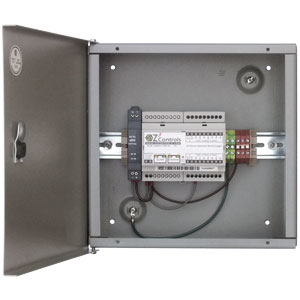NetMeter-OMNI-8C: Installation
Introduction
The NetMeter-OMNI-8C is an 8-channel monitor/logger for pulse, current loop, and voltage output meters/sensors.
Installation
The basic steps for NetMeter-OMNI installation are:
- Order the required components
- Determine how many NetMeter-OMNI devices are required. Each NetMeter-OMNI-8C can accommodate up to 8 inputs and only 2 of the 8 support internal "Backup Power". However, some sensors/meters have multiple outputs and will require one NetMeter-OMNI-8C channel for each output. Plan accordingly.
- If sensors are located at a distance from each other, it may be necessary to employ additional NetMeter-OMNIs as there is a limit how far signals can be run to the NetMeter-OMNI. This will depend on the type of cable used and the level of electrical noise in the environment. For pulse sources, excessive noise can cause extra pulses to be falsely detected.
- Determine what power supplies, enclosures, Ethernet switches, and other accessories are required.
- The Kit version of the NetMeter-OMNI provides the power supply, NEMA1 enclosure, terminal blocks, and other accessories required for a typical application
- Contact Z3 Controls for assistance in planning your installation
- Sensor/meter installation
- Z3 Controls doesn't sell or install mechanical meters/sensors that measure gas, water, steam, etc. The NetMeter-OMNI connects to the pulse and/or analog output of the sensors/mechanical meters and performs the acquisition, logging, communication, and visualization of data.
- For gas or water metering, you may be able to get pulse output from your utility meter: ask your utility provider.
- Will require trades that are appropriate to the type of sensor/meter to be installed. Gas meters, for example, will require a licensed gas installer and inspection as required by local regulations.
- Z3 Controls doesn't sell or install mechanical meters/sensors that measure gas, water, steam, etc. The NetMeter-OMNI connects to the pulse and/or analog output of the sensors/mechanical meters and performs the acquisition, logging, communication, and visualization of data.
- Electrical installation:
- May require a qualified electrician
- The Kit version of the NetMeter-OMNI includes a 120-240V power supply and will require a licensed electrician.
- May require a qualified electrician
- Network installation:
- Connecting the NetMeter-OMNI to an Ethernet network (LAN)
- Typically done by the IT department
- NetMeter configuration/commissioning
- Setting up the NetMeter-OMNI so that it will begin collecting data
- For each sensor/meter signal connected to the NetMeter-OMNI (some sensors have multiple outputs), you will need to know:
- Input mode: analog or pulse
- For pulse sources:
- Pulse source type: dry contact, KYZ, voltage pulse, current pulse
- For voltage or current pulse mode: the range of the input so that the low and high thresholds can be set properly
- The units of measure to be displayed
- For analog sources:
- Analog mode: voltage (0-5V, 0-10V, 0-24V etc), or current loop (4-20mA)
- The units of measure (PSI, Deg. C, M³/min, etc…)
- The scale factor/offset to convert the voltage/current to the units of measure or 2 data points
Electrical installation of the NetMeter is described in the Installation Manual:
Installation Manual
| User Manuals | ||||
|---|---|---|---|---|
| Title | Type | Size | Date | Note |
| NetMeter-OMNI-8C Installation Manual |  |
3.4MB | 2014-02-19 | |

